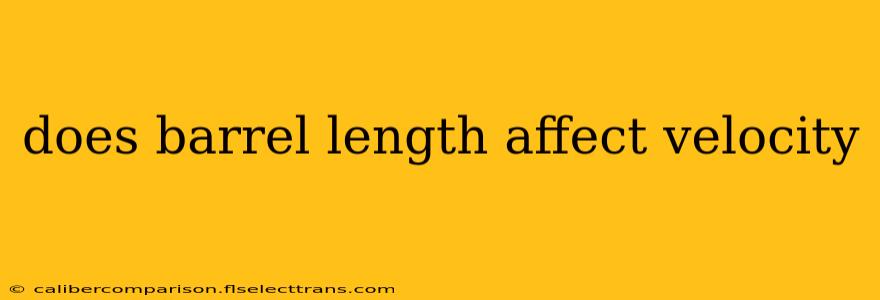The simple answer is: yes, barrel length significantly affects projectile velocity. However, the relationship isn't linear, and understanding the nuances is crucial for anyone interested in firearms, ballistics, or related fields. This article will explore the complex interplay between barrel length and muzzle velocity, examining the physics involved and the practical implications for shooters.
The Physics Behind the Velocity Increase
The process is fundamentally about the pressure exerted by expanding propellant gases on the projectile. A longer barrel provides more time for these gases to act upon the bullet. Here's a breakdown:
- Initial Ignition: When the primer ignites the propellant, a rapid expansion of gases occurs.
- Pressure Build-up: These gases exert pressure on the base of the bullet, propelling it down the barrel. This pressure is initially very high.
- Pressure Drop-off: As the bullet travels down the barrel, the volume behind it increases, causing a gradual pressure drop.
- Longer Barrel, Longer Acceleration: A longer barrel allows the gases to exert pressure on the bullet for a longer duration, resulting in greater acceleration and higher muzzle velocity. The bullet continues to accelerate until it exits the muzzle.
The Law of Diminishing Returns
It's important to note that the velocity increase isn't infinite. There's a point of diminishing returns. After a certain barrel length, the additional velocity gained becomes minimal, often not justifying the increase in overall weapon length and weight. The optimal barrel length varies significantly depending on the cartridge's design and the firearm itself.
Factors Influencing the Relationship
While barrel length is a primary factor, several other variables also play a role:
- Cartridge Type: Different cartridges have different propellant characteristics and bullet weights, influencing how they respond to barrel length changes. A high-pressure cartridge may see a more pronounced increase in velocity with a longer barrel compared to a lower-pressure round.
- Bullet Weight: Heavier bullets generally require longer barrels to reach their maximum velocity.
- Powder Charge: The amount of propellant used significantly affects pressure and velocity. A larger charge will generally yield higher velocities, particularly in longer barrels.
- Barrel Design: The rifling twist rate and the overall barrel construction (material, bore diameter) all impact the bullet's stability and velocity.
Practical Implications for Shooters
Understanding the barrel length-velocity relationship is critical for several reasons:
- Accuracy: Optimizing barrel length for a specific cartridge can improve accuracy by allowing the bullet to reach its optimal velocity and stabilize properly.
- Effective Range: Higher muzzle velocity translates to a flatter trajectory and a longer effective range.
- Recoil: Longer barrels, while generally producing higher velocities, can also contribute to increased recoil, impacting shooter comfort and control.
- Weapon Handling: The overall length and weight of the firearm are directly influenced by barrel length, impacting maneuverability and ease of handling.
Conclusion
Barrel length is a crucial factor determining projectile velocity. While longer barrels generally yield higher velocities, this relationship isn't linear and is influenced by various factors. Choosing the right barrel length requires considering the specific cartridge, intended use, and desired balance between velocity, accuracy, recoil, and overall weapon handling characteristics. Understanding these dynamics is key for any serious shooter or firearms enthusiast.

